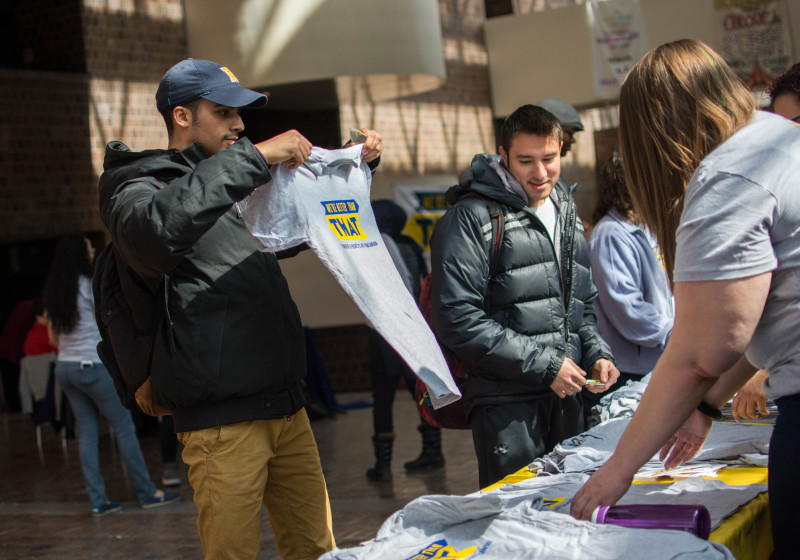Students took aim at the University’s “We’re Better Than THAT” campaign’s Monday giveaway event this week, deriding the celebration as impersonal and ignorant of the issues that sparked the movement in the first place.
The event was held to celebrate the United Nation’s International Day for the Elimination of Racial Discrimination.
“It was just a mechanical act of grabbing a shirt and leaving,” said sophomore Jacob Tyson, an All-Campus Judicial Council Associate Justice. “That was it―no conversation.”
The “We’re Better Than THAT” campaign’s goal throughout this semester and in the future is to educate students, faculty, and staff on ways to stop hate speech and racism in our community. The campaign also aims to educate these groups on how to approach discussing divisive topics.
Students in Wilson Commons on Monday were approached by representatives of the campaign and instructed to go to Hirst Lounge to receive a free t-shirt in support of the anti-racism movement. Attendees were asked to swipe their IDs and sign a large poster in support.
Other students expressed a lackluster reaction to the campaign’s event. Sophomore Katy Hasselwander, when asked about the campaign, said she hadn’t heard anything about the event from the campaign itself. “I know the idea behind of it, but that’s only from word of mouth,” she said.
“I swiped my ID and got a shirt,” she continued. “That’s it.”
Associate Dean of Diversity of Arts Beth Olivares, who is a member of the commission that created the campaign, acknowledged that student criticisms were expected and, in some regards, correct.
“Giving away t-shirts is cute, but what’s the point?” she said via email. “If all we did, or were planning to do, is give out shirts, then yes, please call bullshit on that, and I’ll be right there with you. But this is just the beginning.”
She said that the goal of Monday’s event was to get as many students talking as possible, and that many students engaged in “meaningful conversations during the event.” The campaign’s next goal is to host educational events and workshops geared toward teaching people about racism.
“We are not interested in quick fixes or ready-made solutions,” Olivares said. “They just don’t work.”
Some students felt apprehensive about participating in the event.
Jessica Shang, a freshman, chose not to participate. She did, however, come to observe.
“I walked over to Hirst Lounge after someone from ResLife told me that the event was happening,” she said, recounting. “I was motioned over to the table, but I chose not to go after seeing that each person spent no more than maybe five minutes there.”
Fellow freshman Eleanor Haase also chose not to participate in this event.
“While I agree with the objective of the campaign,” she said of her decision. “I don’t think giving everyone free t-shirts unified the school in any way especially if there’s no attempt to educate people while giving out these free things.”
Tyson pointed his critiques at the administration itself, saying, “Holding events like the one in Hirst Lounge without actually educating people on key issues like what racism is, how it affects our campus community, and, more importantly, how it impacts the lives of students shows that the university administration is outdated in its mindset.”
Frankly, he thought the event displayed “the administration’s ignorance of how this directly affects students and their lives.”
In terms of increasing awareness, Olivares believes the campaign met its goal with its event on Monday.
“People are talking about the campaign, and arguing its relative merit, which is terrific,” she said. “In fact, I’ve been at UR for a long time, and I can honestly say that more people, and different kinds of people, are talking about race and racism and oppression, and ways to end them, than I have witnessed at any other time.
That, she said, was in itself progress.
“Insufficient, of course, but a step in the right direction.”


